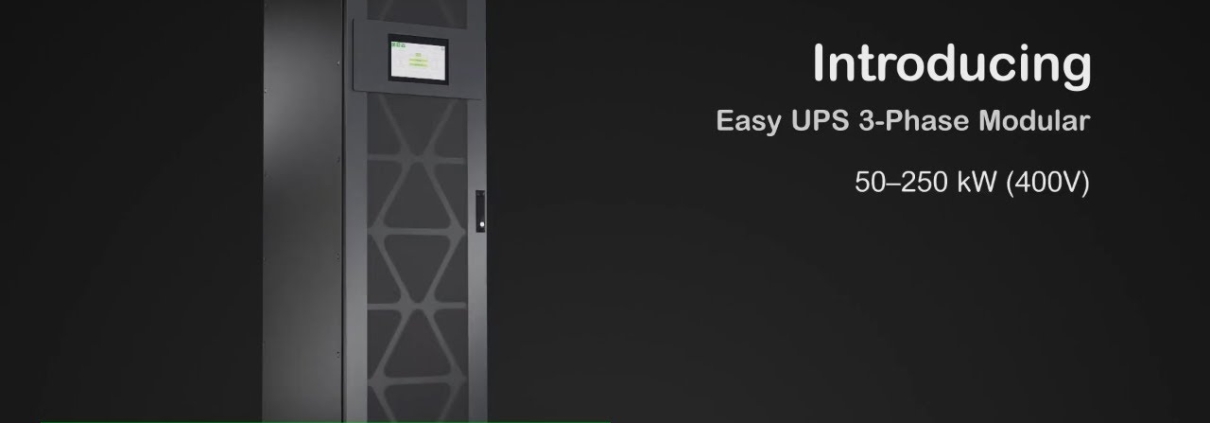The Easy UPS 3-Phase for Schneider
The New Easy UPS 3-Phase Modular UPS is a scalable, easy-to-deploy 3-phase uninterruptible power supply with a compact footprint that optimises capital investment for small and medium data centres and other business-critical applications. This UPS is EcoStruxure™ connected to give you peace of mind anytime, anywhere.
-
- Optimise your capital investment with the pay-as-you-grow scalable design
- Boost your availability with N+1 redundancy options
- Expand capacity fast with no scheduled downtime, with third-party verified Live Swap of power modules
- Conserve valuable real estate in style, with up to 250 kW N+1 of power protection in a sleek black one-rack design
- This UPS is EcoStruxure™ connected to give you peace of mind anytime, anywhere. Start-up service is included to optimise your system’s performance, quality, and safety.
What are the benefits of Modular UPS?
Modular uninterruptible power supply (UPS) systems offer several advantages compared to traditional, non-modular UPS solutions. The below overview will highlight the benefits.
UPS Scalability:
One of the main advantages of modular UPS is scalability. Modular systems allow you to add or remove power modules based on your changing power requirements. A modular design enables you to scale your power protection infrastructure easily as your business grows or as power needs change.
Increased Availability and Reliability:
Modular UPS systems typically feature a redundant or N+1 architecture, meaning that if one module fails, the others continue to support the load without interruption. This design improves system reliability and availability, reducing the risk of downtime due to a single point of failure.
Ease of Maintenance:
Modular UPS systems are designed for easy maintenance. In the event of a failure, it is often possible to replace or service individual modules without shutting down the entire system. This results in lower maintenance costs and reduced downtime during repairs.
Efficiency:
As it is more efficient to run a UPS closer to its design load, modular UPS systems can be more energy-efficient than traditional UPS systems during periods of low load. Some modular designs allow for power modules to be turned off when not needed, increasing overall efficiency and reducing energy consumption.
Flexibility in Configuration:
Modular UPS systems offer flexibility in terms of configuration. You can configure the system to meet specific power capacity requirements, and you have the option to mix and match modules based on your needs. This adaptability is particularly beneficial in dynamic IT environments.
Modular UPS Cost Savings:
While the initial upfront cost of a modular UPS system may be slightly higher than that of a traditional UPS, the scalability and efficiency of modular systems can lead to cost savings over time. As your power requirements evolve, you can expand your system without having to replace the entire UPS infrastructure.
Hot-Swappable Components:
Many modular UPS systems feature hot-swappable components, including the inverter/rectifier static swich and intelligence modules, allowing you to replace or upgrade modules without shutting down the entire system. This capability contributes to increased uptime and operational continuity.
Parallel Redundancy:
Modular UPS systems often support parallel redundancy, meaning multiple UPS modules can work together to share the load. If one module fails, the others can compensate, providing a higher level of redundancy and ensuring continuous power supply.
It’s important to note that the specific benefits of a modular UPS system can vary depending on the design and implementation of the system, so it’s advisable to carefully consider your specific requirements and consult with experts in the field when choosing a UPS solution for your needs.




